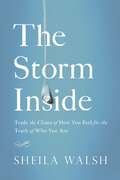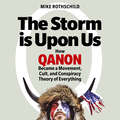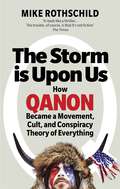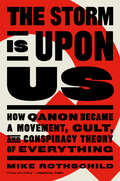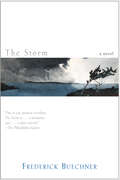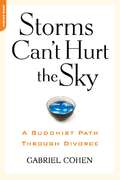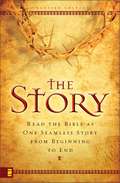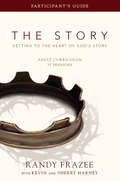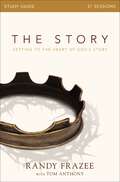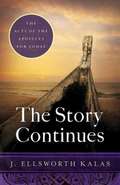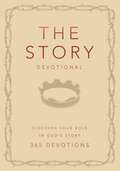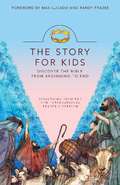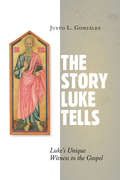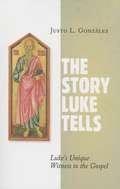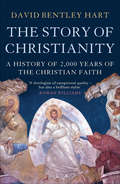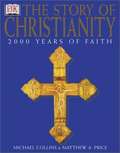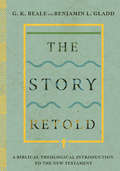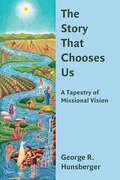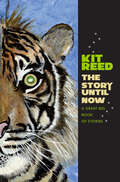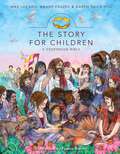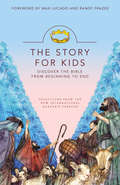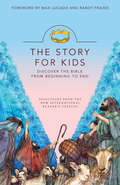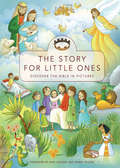- Table View
- List View
The Storm Inside: Trade the Chaos of How You Feel for the Truth of Who You Are
by Sheila WalshWomen feel the storm activity all around. We find ourselves teetering somewhere between everyday chaos and crisis. We can feel a storm brewing, we are in the middle of a storm, or we are facing the aftermath of a storm. But don't be afraid because it is possible to grow through turbulent times. Storms show you what's really going on inside, reveal what you really believe, and actually make you stronger. In this powerful book Sheila will help you: Redefine your failures as a new beginning instead of an end. Replace the words always and never in your life with positive declarations of hope. Know with confidence how to help a friend in chaos or crisis.
The Storm Is Upon Us: How QAnon Became a Movement, Cult, and Conspiracy Theory of Everything
by Mike Rothschild***"An ideal tour guide for your journey into the depths of the rabbit hole that is QAnon, and even shows you a glimmer of light at the exit." - Cullen Hoback, director of HBO's Q: Into the StormIn 2017, President Trump made a cryptic remark at a gathering of military officials, describing it as 'the calm before the storm'-then refused to explain himself to puzzled journalists. But on internet message boards, a mysterious poster called 'Q Clearance Patriot' began an elaboration all of their own.Q's wild yarn hinted at a vast conspiracy that satisfied the deepest desires of MAGA-America. None of Q's predictions came to pass. But did that stop people from clinging to every word, expanding Q's mythology, and promoting it ever more widely? No.Conspiracy culture expert Mike Rothschild is uniquely equipped to explain QAnon, from the cults that first fed into it, to its embrace by Trump and the right-wing media. With families torn apart and with the Capitol under attack, he argues that mocking the madness of QAnon will get us nowhere. Instead, he argues that QAnon tells us everything we need to know about global fear after Trump-and that we need to understand it now, because it's not going away.(p) 2021 Octopus Publishing Group
The Storm Is Upon Us: How QAnon Became a Movement, Cult, and Conspiracy Theory of Everything
by Mike Rothschild*****'A chilling overview of a movement that should arguably have no place in any healthy, well-educated society.' - The Telegraph'A compelling book.' - The Guardian'The Storm Is Upon Us is an impressive piece of research and a gripping read. Rothschild's book reads like a thriller, with cliffhangers that leave you eager for the next episode. The trouble, of course, is that it's not fiction.' - The Times'An ideal tour guide for your journey into the depths of the rabbit hole that is QAnon, and even shows you a glimmer of light at the exit.' - Cullen Hoback, director of HBO's Q: Into the StormIn 2017, President Trump made a cryptic remark at a gathering of military officials, describing it as 'the calm before the storm'-then refused to explain himself to puzzled journalists. But on internet message boards, a mysterious poster called 'Q Clearance Patriot' began an elaboration all of their own.Q's wild yarn hinted at a vast conspiracy that satisfied the deepest desires of MAGA-America. None of Q's predictions came to pass. But did that stop people from clinging to every word, expanding Q's mythology, and promoting it ever more widely? No.Conspiracy culture expert Mike Rothschild is uniquely equipped to explain QAnon, from the cults that first fed into it, to its embrace by Trump and the right-wing media. With families torn apart and with the Capitol under attack, he argues that mocking the madness of QAnon will get us nowhere. Instead, he argues that QAnon tells us everything we need to know about global fear after Trump-and that we need to understand it now, because it's not going away.
The Storm is Upon Us: How QAnon Became a Movement, Cult, and Conspiracy Theory of Everything
by Mike Rothschild"An ideal tour guide for your journey into the depths of the rabbit hole that is QAnon. It even shows you a glimmer of light at the exit." —Cullen Hoback, director of HBO's Q: Into the Storm Its messaging can seem cryptic, even nonsensical, yet for tens of thousands of people, it explains everything: What is QAnon, where did it come from, and is the Capitol insurgency a sign of where it&’s going next? On October 5th, 2017, President Trump made a cryptic remark in the State Dining Room at a gathering of military officials. He said it felt like &“the calm before the storm&”—then refused to elaborate as puzzled journalists asked him to explain. But on the infamous message boards of 4chan, a mysterious poster going by &“Q Clearance Patriot,&” who claimed to be in &“military intelligence,&” began the elaboration on their own. In the days that followed, Q&’s wild yarn explaining Trump's remarks began to rival the sinister intricacies of a Tom Clancy novel, while satisfying the deepest desires of MAGA-America. But did any of what Q predicted come to pass? No. Did that stop people from clinging to every word they were reading, expanding its mythology, and promoting it wider and wider? No. Why not? Who were these rapt listeners? How do they reconcile their worldview with the America they see around them? Why do their numbers keep growing? Mike Rothschild, a journalist specializing in conspiracy theories, has been collecting their stories for years, and through interviews with QAnon converts, apostates, and victims, as well as psychologists, sociologists, and academics, he is uniquely equipped to explain the movement and its followers. In The Storm Is Upon Us, he takes readers from the background conspiracies and cults that fed the Q phenomenon, to its embrace by right-wing media and Donald Trump, through the rending of families as loved ones became addicted to Q&’s increasingly violent rhetoric, to the storming of the Capitol, and on. And as the phenomenon shows no sign of calming despite Trump&’s loss of the presidency—with everyone from Baby Boomers to Millennial moms proving susceptible to its messaging—and politicians starting to openly espouse its ideology, Rothschild makes a compelling case that mocking the seeming madness of QAnon will get us nowhere. Rather, his impassioned reportage makes clear it's time to figure out what QAnon really is — because QAnon and its relentlessly dark theory of everything isn&’t done yet.
The Storm: A Novel
by Frederick BuechnerThe Boston Globe calls Frederick Buechner "one of our finest writers." USA Today says he's "one of our most original storytellers." Now this acclaimed author gives us his most beguiling novel yet--a magical tale of love, betrayal, and redemption inspired by Shakespeare's The Tempest.On wealthy Plantation Island in South Florida, an old man waits, Kenzie Maxwell is a writer, a raconteur, a rascal, an altruist, a mystic--a charismatic figure who enjoys life with his rich third wife but muses daily on the sins of his past. Two decades ago, Kenzie had to leave New York because of a scandal. He'd been a volunteer at a runawat shelter, and he'd fallen in love with a seventeen-year-old girl--a girl who died while giving birth to Kenzie's daughter. His older brother, Dalton, a lawyer and board member at the shelter, decided to quell the rumors by releasing Kenzie's note of apology to the press. Kenzie's reputation--and the girl's--were destroyed. He has never forgiven his brother.Now it's the eve of Kenzie's seventieth birthday, and a storm is brewing. His beloved daughter, Bree--the child of the scandal--is coming down from New York for his birthday party. But his brother Dalton is coming down, too, to do some legal work for the island's ill-tempered matriarch. Aided and abetted by Dalton's happy-go-lucky stepson, a loutish gardener, a New Age windsurfer, a bumbling bishop, and a bona fide tempest, Kenzie must somehow contrive to reconcile with his brother--and make peace with his past.Infused with humanity, and informed by faith. The Storm is Frederick Buechner's most captivating novel since Godric--a richly satisfying contemporary story of fragmented families and love's many mysteries that will move you, makeyou laugh, and fill you with wonder.
The Storms Can't Hurt the Sky: The Buddhist Path through Divorce
by Gabriel CohenBuddhism has been applied to everything from parenting to golf, but until now no one has offered Buddhist principles as a healing path through divorce. In Storms Can’t Hurt the Sky, Gabriel Cohen bravely delves into his personal experience-along with insights from Buddhist masters, parables, humor, social science studies, and interviews with other divorcés-to provide a practical and very helpful guide to surviving the pain of any break-up. Focusing on the emotions most common in the dissolution of a relationship-anger, resentment, loss, and grief-Storms Can’t Hurt the Sky shows how thinking about these feelings in surprisingly different ways can lead to a radically better experience. This compulsively readable book offers sound advice and much-needed empathy for anyone dealing with a break-up.
The Story
by ZondervanThe Story offers an exciting alternative to a traditional Bible. It allows you to follow the story of the Bible in its own words. And what a story! The Bible is filled with stories of love, war, birth, death and miracles. There's poetry, culture, history and theology. It's a suspense novel, a book of sociology, a history lesson -- all woven around one, eternal conflict: good versus evil. This story offers a glimpse of people in a different time and place who are yet very much like us today. The Story opens a door to truth that can be found nowhere else. A door for which every person is consciously or unconsciously searching. A door that leads to freedom, hope and God himself!
The Story Adult Curriculum Participant's Guide: Getting to the Heart of God's Story
by Randy Frazee Kevin HarneyTo understand the Bible, says author and pastor Randy Frazee, you need bifocal lenses, because two perspectives are involved. The Lower Story, our story, is actually many stories of men and women interacting with God in the daily course of life. The Upper Story is God’s story, the tale of his great, overarching purpose that fits all the individual stories together like panels in one unified mural. In 31 video sessions, The Story video curriculum will open your eyes to God’s master-plan unfolding in the lives of the Bible’s characters-and in your own life. Discover the heart of God’s Upper Story, and the joy that comes as you align your story with God’s. The Story DVD and Participant’s Guide (sold separately) are designed for use by groups of all sizes, including small groups and Sunday school and adult education classes, for each of the 31 weeks of The Story church-wide journey.
The Story Bible Study Guide: Getting to the Heart of God's Story (The Story)
by Randy FrazeeThe Story group Bible study provides groups of all sizes the opportunity to discuss and apply what they experience during the 31-week The Story church campaign.To understand the Bible, says Frazee, you need bifocal lenses, because two perspectives are involved. The Lower Story, our story, is actually many stories of men and women interacting with God in the daily course of life.The Upper Story is God&’s story, the tale of his great, overarching purpose that puts the individual stories together like panels in one unified mural.In 31 sessions, The Story video-based group study opens your eyes to God&’s master plan unfolding in the lives of the Bible&’s characters and in your own life.Discover the heart of God&’s Upper Story, and the joy that comes as you align your story with God&’s. The Story Study Guide and DVD (sold separately) are designed for use by groups of all sizes, including small groups and Sunday school and adult education classes.Designed for use with The Story Adult Curriculum Study DVD (9780310329527) sold separately.
The Story Continues: The Acts of the Apostles for Today
by J. Ellsworth KalasAt the very beginning of our faith, the Christian population numbered afew thousand, measuring only one percent of the world population. Today asingle mega-church can boast a comparable number, and together,Christians now number more than two billion people. It all beganwith this little body of believers who knew a secret that needed to beshared. How did they do it? And what can we learn from them?Joinbest-selling author and beloved pastor, J. Ellsworth Kalas, as heexplores the book of Acts to uncover the ministry motivations of thefirst followers—ordinary people who accomplished the extraordinary andwho can serve as a guide for today’s believers to carry on. Because thework is not done. The story continues…This book contains a discussion guide.
The Story Devotional: Discover Your Role in God's Story
by ZondervanLike The Story, The Story Devotional will guide readers through the overarching narrative of the Bible in 365 days. Combining Scripture with bite-sized reflections and a daily takeaway, readers will be able to work their way through God's epic Story and focus on His plan for their lives. Following the same chronological organization as The Story, readers will see their lives in a whole new light, with purpose as part of God's eternal story. Using the takeaway message at the end of each devotion, readers can apply the teachings of the Bible to their daily life. This book can be used in conjunction with The Story or as a stand alone devotional.This is the first devotional product in The Story line.Trim Size: 5 x 7
The Story For Kids: Discover The Bible From Beginning To End
by Max Lucado Randy Frazee Zondervan Bibles StaffAdventure. Humor. Drama. Now kids can discover God's great love story in a new format! As you read, you will uncover the "big picture. " Kids will find out that God's story is not just a collection of random adventures--it's a complete story that tells about God's great love for his people. Using the New International Reader's Version (NIrV) of the Bible, The Story for Kids reads like a novel. Events, characters, and teachings are arranged in order to show God's unfolding story. Kids will love reading the greatest story ever told! The Story for Kids is a unique edition of the New International Reader's Version (NIrV) of the Bible done in story format to parallel the adult and teen editions of the church-wide campaign, The Story.
The Story Keeper (A Carolina Heirlooms Novel #2)
by Lisa WingateAccording to Gee Gee Rosell, "Moving to New York City doesn't break the strong ties to her Appalachian heritage the way Jen Gibbs hopes it will. She finds her ancestors beckoning her when an anonymous manuscript mysteriously appears on her desk. The Story Keeper mixes soul-deep darkness with the possibility of redemption..."
The Story Luke Tells: Luke's Unique Witness to the Gospel
by Justo L. GonzalezAmong New Testament writers, who is the best historian? Without a doubt, says Justo Gonzalez, it’s Luke. Concerned about the particulars of people and events, Luke also gives readers the big picture, positioning the stories of Jesus not just in the history of Israel but in the history of humankind. Luke uniquely tells us the grand story of salvation -- then and now.Gonzalez skillfully highlights key themes in Luke’s storytelling, including his strong emphasis on God’s “great reversals,” his keen interest in shared meals and their intimate connection to worship and communion, and his passionate underscoring of both the saving work of Christ and the indwelling power of the Holy Spirit. Writing in a conversational style, Gonzalez draws readers into Luke’s story with fresh overviews and rich details, showing how Luke invites us to continue his gospel witness today.Watch a 2014 interview with the author of this book here:
The Story Luke Tells: Luke's Unique Witness to the Gospel
by Justo L. GonzálezAmong New Testament writers, who is the best historian? Without a doubt, says Justo Gonzalez, it's Luke. Concerned about the particulars of people and events, Luke also gives readers the big picture, positioning the stories of Jesus not just in the history of Israel but in the history of humankind. Luke uniquely tells us the grand story of salvation -- then and now. Gonzalez skillfully highlights key themes in Luke's storytelling, including his strong emphasis on God's great reversals, his keen interest in shared meals and their intimate connection to worship and communion, and his passionate underscoring of both the saving work of Christ and the indwelling power of the Holy Spirit. Writing in a conversational style, Gonzalez draws readers into Luke's story with fresh overviews and rich details, showing how Luke invites us to continue his gospel witness today.
The Story Of A Whim (Grace Livingston Hill #68)
by Grace Livingston Hill"A passing fancy--or a life-changing event? What would he do with Sunday-school books? The old organ that arrived with his belongings would provide some music for his lonely life, but the thought of him starting a Sunday school was laughable. Still, he would write to his benefactor and thank her. It was the least he could do. Better not tell her he was a young man, though. Why embarrass her? If she were an example of Christianity, maybe he should even take a look at that Bible she sent. What could it hurt?" [From the front dust jacket flap:] It began as a whim--a sudden urge to help an unknown girl named Christie. Hazel Winship and her college friends saw the worn furniture on the train platform and decided to do a little sprucing-up before the furniture was shipped. Adding an old organ, a Bible, and some Sunday school materials to the boxes, they sent the shipment on its way, sure they had helped some poor missionary girl in Florida. But Christie Bailey was anything but a poor missionary girl. He was a struggling citrus farmer--a wild young man who had no intention of starting a Sunday school! Many changes would come to his life as a result of Hazel's whim, including some serious problems. How could he tell her he was not a girl--especially after they began corresponding? He had found Christ because of Hazel, but now he was trapped in a deception he could not untangle! #1. Where Two Ways Met, #2. Bright Arrows, #3 A Girl to Come Home To, #13 In Tune with Wedding Bells, #15 Marigold, #18 brentwood, #24 by way of the silverthorns, #26. The Seventh Hour, #30 Matched Pearls, 33 Happiness Hill, #38 Spice Box, #41 blue ruin, #42 A New Name, 47 The Street of the City, #50 The Finding of Jasper Holt, #55 Ladybird, #61 Mystery Flowers, #66 The Girl From Montana, #68 The Story of a Whim, #70 in the way, #71 exit Betty, #72. The White Lady, #73 Not Under the Law, #74 Lo Michael, #76 The City of Fire, #77. The Ransom, #84 Cloudy Jewel, #93 Katharine’s yesterday, and #95 Mary Arden, with many more on the way.
The Story Of Christianity
by David Bentley HartThe story of Christianity is an immeasurably fascinating one. A faith that began in Roman occupied Palestine, as a small and fugitive faction within Judaism, grew, thrived and finally "conquered" the empire that had sought to exterminate it. Then, over many centuries and in many lands, it became the vital source from which new civilizations sprang. At times, its geographical range expanded mightily, at others contracted perilously. At times, the church proved heroically true to its deepest moral principles; at others, inexcusably traitorous to them. But, by the beginning of the 21st century, this faith that began in such fragility, and that became so powerful--even though its temporal power has now receded in its historic homelands--is the most widespread and diverse of all religions. Christianity is rapidly taking root in cultures very different from those in which it was born and in which it once flourished, and is assuming configurations that could not have been anticipated a century ago. In The Story of Christianity, the distinguished theologian David Bentley Hart provides a broad picture of Christian history. Presented in 50 short chapters--each focusing on a critical facet of Christian history or theology, and each amplified by timelines, quotations, and color images--his magisterial account does full justice to the range of Christian tradition, belief and practice--Eastern Orthodox, Roman Catholic, Anglican, Presbyterian, Evangelical, Coptic, Chaldean, Ethiopian Orthodox, Armenian Orthodox, Malankaran, to name but a few of the many possibilities. From the persecutions of the early church to the papal-imperial conflicts of the Middle Ages, from the religious wars of 16th and 17th-century Europe to the challenges of science and secularism in the modern era, and from the ancient Christian communities of Africa and Asia to the "house churches" of contemporary China, The Story of Christianity triumphantly captures the heterogeneous richness of Christian history.
The Story Of Christianity
by Michael Collins Matthew A. PriceCo-written by a Roman Catholic priest and a Protestant minister, this balanced, richly illustrated history of the Christian religion traces the two-thousand-year development of the world’s largest organized religion, from its Old Testament roots to the present day.
The Story Retold: A Biblical-Theological Introduction to the New Testament
by G. K. Beale Benjamin L. GladdisThe Story Retold
The Story That Chooses Us: A Tapestry of Missional Vision (The Gospel and Our Culture Series (GOCS))
by George R. HunsbergerOver the course of several decades, missiologist George Hunsberger has written numerous essays on crucial themes for the church’s recovery of its missional identity and practice. The Story That Chooses Us brings these essays together for the first time.The book as a whole presents a composite sense of the missional identity and faithful witness to which the church is called in contemporary Western society. Hunsberger engages with well-known missiologist Lesslie Newbigin throughout his work as he carefully discerns biblical and theological roots for a contemporary vision of missional theology. The recurring themes in Hunsberger’s essays provide both theological mooring and practical guidance for churches following Christ on the missional path.
The Story Until Now: A Great Big Book of Stories
by Kit ReedThe best stories from a master of speculative fiction Called "one of our brightest cultural commentators" by Publishers Weekly, Kit Reed draws from life—with a difference. This new collection brings together thirty-four of her strong, original stories, from early classics like "The Wait" and "Winter" to six never-before-collected short stories, including "The Legend of Troop 13" and "Wherein We Enter the Museum." An early favorite, "Automatic Tiger," is the first in a series of Reed's stories about animals. There's a monkey who grinds out bestsellers with the help of a "creative writing" app. Her uncanny black dog can enter a crowded room and sit down at the feet of the next man to die. Her characters confront war in various arenas: mother/daughter battles, the war of the sexes, the struggles of men scarred by war. Kit Reed's self-described "transgenred" fiction is confirmation of an "extraordinary talent" (The Financial Times). The range and complexity of her work speaks for itself in The Story Until Now.
The Story for Children, a Storybook Bible (The Story)
by Max Lucado Randy Frazee Karen Davis HillBestselling author Max Lucado presents The Story for Children storybook Bible, written with Randy Frazee as part of The Story campaign. Geared for children 4-7, this storybook Bible includes over 60 stories that allow readers to discover that God’s story is not just a collection of random adventures—it’s a complete story that tells about God’s great love for his people.
The Story for Kids, NIrV
by ZondervanAdventure. Humor. Drama. Now kids can discover God’s great love story in a new format! As you read, you will uncover the “big picture.” You’ll find out that God’s story is not just a collection of random adventures—it’s a complete story that tells about God’s great love for his people. Using the New International Reader’s Version (NIrV) of the Bible, The Story for Kids reads like a novel. Events, characters, and teachings are arranged in order to show God’s unfolding story. This revised edition has updated transitions and all-new artwork. You’ll love reading the greatest story ever told!
The Story for Kids: Discover the Bible from Beginning to End (The Story)
by Max Lucado and Randy Frazee Zonderkidz"Adventure. Humor. Drama. Now kids can discover God’s great love story in a new format! As you read, you will uncover the “big picture.” You’ll find out that God’s story is not just a collection of random adventures—it’s a complete story that tells about God’s great love for his people. Using the New International Reader’s Version, The Story for Kids reads like a novel. Events, characters, and teachings are arranged in order to show God’s unfolding story. With fun art and thought-provoking questions, you’ll love reading the greatest story ever told!"
The Story for Little Ones
by ZondervanNow that they know their ABCs and 1-2-3s, are your children ready to start reading? The Picture That! Bible Storybook will help kids ages 6 and under feel like reading is easy-and fun too! This picture reader sprinkles over 90 full-color picture icons into more than 65 Bible stories. Noah and the ark full of animals, David and the giant, Jesus calming the storm, the angel at the empty tomb-these are just a few of the Old and New Testament stories your kids will be reading-yes reading! The icons will encourage them to jump from picture to picture and then try to read some words in between. To help keep things interesting, various layouts with full-page illustrations and some larger picture icons fill the pages of the Picture That! Bible Storybook-readers will be excited to see what's coming next! And at the end of each story, a simple, one-line lesson helps children remember what it teaches and offers to apply what they learn. Based on the New International Reader's version (the Bible translation for beginning readers), the Picture That! Bible Storybook is reading at its easiest. This unique, creative book is bound to become a favorite with children and parents alike. Written by best-selling author Tracy Harrast.
